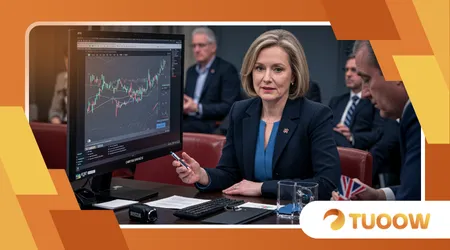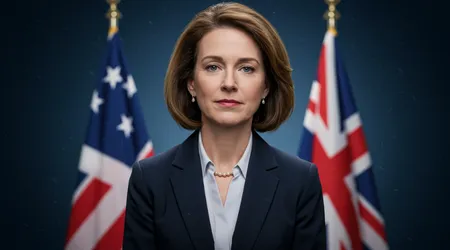Rachel Reeves Heads to Washington Seeking New US Trade Deal Amid Tariff Threats

As Chancellor Rachel Reeves jets to Washington seeking a new US trade deal, the stakes for the UK economy couldn’t be higher.
With President Donald Trump’s sweeping tariffs 10% on most British goods and 25% on cars and steel threatening £24 billion in economic losses, Reeves faces a delicate balancing act.
Her mission at the International Monetary Fund’s spring meeting is clear: advocate for free trade, protect key UK industries, and navigate a protectionist US administration.
But can she secure a deal that safeguards British interests without compromising sovereignty?
This column explores the economic, political, and strategic dimensions of Reeves’ high-stakes trip, offering insights into what’s at play and why it matters.
The UK’s trade relationship with the US, its largest single export market at £183 billion annually, hangs in the balance.
Reeves’ visit comes amid global economic turbulence, with Trump’s “Liberation Day” tariffs disrupting markets and fueling fears of a trade war.
From steel plants in Scunthorpe to car factories in the Midlands, British businesses are reeling. Yet, Reeves is not just fighting for tariff relief; she’s championing a vision of open global trade.
This article unpacks her strategy, the challenges ahead, and the broader implications for UK finance and industry.
The Tariff Threat: A £24 Billion Economic Storm
Trump’s tariffs hit the UK hard, with a 10% levy on most goods and a 25% tax on cars and steel. These measures, implemented in early 2025, target Britain’s core exports.
Cars, valued at £8.3 billion annually, face crippling costs, while steel producers like British Steel grapple with financial distress.
The Office for Budget Responsibility estimates these tariffs could shave £24 billion off the UK economy by 2027, a figure Reeves cannot ignore.
Consider a car manufacturer in Birmingham exporting to the US. A 25% tariff hikes the price of a £30,000 vehicle by £7,500, pricing it out of the market.
This isn’t just numbers it’s jobs, livelihoods, and communities at risk. Reeves’ push for a new US trade deal aims to ease these burdens, but the US holds the upper hand.
Trump’s administration sees tariffs as leverage, generating revenue while forcing countries to the negotiating table.
++UK Inflation Falls to 2.6% in March, Easing Pressure on Bank of England’s Interest Rate Decisions
The chancellor’s challenge is to convince US Treasury Secretary Scott Bessent that a new US trade deal benefits both sides.
UK officials are pessimistic about exemptions from the 10% blanket tariff, but targeted relief for cars and steel is possible.
Reeves must tread carefully, ensuring any concessions like tax breaks for US tech firms don’t undermine British interests.
The stakes are monumental, and failure could deepen the UK’s economic woes.

Reeves’ Strategy: Free Trade Advocacy Meets Realpolitik
At the IMF summit, Reeves will make a passionate case for free global trade, arguing that no one wins in a trade war.
Her meetings with G7 and G20 counterparts will rally support for open markets, but her real focus is bilateral talks with Bessent.
A new US trade deal could reduce tariffs, particularly the 25% levies hammering UK car and steel exports. But Trump’s “America First” ethos complicates matters.
Reeves’ approach blends idealism with pragmatism. She’s offered concessions, like easing digital taxes on US tech giants, to sweeten the deal.
Also read: Best Banks in the UK for Savings Accounts in 2025
Yet, she’s firm on red lines: any new US trade deal must prioritize British interests.
For example, lowering tariffs on UK pharmaceuticals could boost firms like AstraZeneca, but Reeves won’t sacrifice food standards or NHS protections to get there.
This strategy is like navigating a tightrope in a storm. Reeves must charm a skeptical US administration while reassuring UK businesses and voters.
Her visit to a British Steel plant in Scunthorpe last week, owned by China’s Jingye, signaled her commitment to industry.
But with Trump pressuring allies to curb ties with Beijing, Reeves’ refusal to disengage economically from China adds another layer of complexity.
The Global Context: A Shifting Economic Landscape
Trump’s tariffs aren’t just a UK problem they’re reshaping global trade. China faces 145% duties, prompting retaliatory 125% tariffs on US goods.
The S&P 500 has tanked, and the IMF is expected to downgrade 2025 growth forecasts. Reeves’ push for a new US trade deal is part of a broader fight to stabilize markets and prevent a global recession.
European allies share the UK’s concerns, but their leverage is limited.
The EU’s “zero-for-zero” tariff proposal mutual elimination of bilateral duties hasn’t gained traction with Trump.
Reeves will urge European finance ministers to align on trade and boost defense spending, signaling unity against protectionism.
A new US trade deal could set a precedent, but the UK risks being outmaneuvered by bigger players like the EU or India.
The global stakes are stark. A trade war could disrupt supply chains, inflate prices, and erode consumer confidence.
UK exporters, already battered by Brexit, face a double blow. Reeves’ Washington trip is a chance to reset the narrative, positioning the UK as a free-trade beacon in a protectionist world.
Domestic Fallout: Supporting UK Exporters
Back home, Reeves is bolstering exporters hit by tariffs. She’s announced a £20 billion package through UK Export Finance to help firms find new markets.
This lifeline targets small businesses, like a Yorkshire textile firm pivoting to Asia after US tariffs priced out its American clients. Such measures show Reeves is proactive, but they’re a bandage on a deeper wound.
British Steel’s emergency nationalization, passed by Parliament in April 2025, highlights the crisis. The 25% US tariffs exacerbated the firm’s losses, threatening thousands of jobs.
Reeves’ push for a new US trade deal aims to restore competitiveness, but she’s also exploring EU trade alignments to diversify export markets.
This dual strategy reflects her urgency to shield the UK from Trump’s trade chaos.
Public sentiment is tense. Posts on X reveal frustration, with users like @JimFergusonUK warning of a “crisis mode” economy.
Reeves must balance bold diplomacy with tangible domestic wins. Her £20 billion export boost is a start, but without tariff relief, small firms face an uphill battle.
The Political Tightrope: Can Reeves Deliver?
Securing a new US trade deal is as much a political test as an economic one. Reeves’ Labour government, elected in 2024, promised economic stability.
Failure in Washington could embolden critics, who argue Labour’s too soft on Trump.
Conversely, a deal however modest would be a coup, proving Labour can deliver where the Conservatives faltered.
The political calculus is tricky. Trump’s team, including Vice President JD Vance, has signaled openness to a UK deal, citing balanced trade ties.
But Trump’s claim that he’s in “no rush” suggests he’s playing hardball. Reeves must project strength while avoiding concessions that spark backlash at home, like lowering food standards.
What’s more, Parliament demands a say. The Guardian’s editorial on April 17, 2025, insisted MPs vote on any deal to protect regulatory standards.
Reeves’ reluctance to commit to a Commons vote risks alienating backbenchers.
Her challenge is to craft a deal that satisfies Trump, Parliament, and the public a tall order in today’s polarized climate.
The Bigger Picture: UK’s Place in a Protectionist World
Beyond tariffs, Reeves’ trip signals the UK’s ambition to redefine its global role. Post-Brexit, Britain’s low-tariff regime second only to Australia’s makes it a free-trade outlier.
A new US trade deal could reinforce this identity, but at what cost?
Lowering standards to appease Trump risks alienating the EU, a key partner in Reeves’ long-term vision.
The chancellor’s refusal to ditch economic ties with China, despite US pressure, is a bold move. Visiting British Steel’s Chinese-owned plant, she argued that disengaging from Beijing is “foolish.”
This stance strengthens her free-trade credentials but could irk Trump’s team, who view China as a strategic foe.
Reeves is betting on a multipolar trade strategy, balancing the US, EU, and Asia.
Imagine the UK economy as a ship navigating stormy seas. Reeves is the captain, steering toward a new US trade deal while dodging icebergs like protectionism and geopolitical tensions.
Her success hinges on agility securing tariff relief without capsizing Britain’s principles. The world is watching, and the outcome will shape the UK’s economic future.
Data Snapshot: UK Exports to the US
| Sector | Export Value (2024) | Tariff Impact |
|---|---|---|
| Cars | £8.3 billion | 25% |
| Steel | £1.2 billion | 25% |
| Pharmaceuticals | £5.8 billion | 10% (pending) |
| Total Goods | £183 billion | 10% (baseline) |
Conclusion: A Defining Moment for Reeves and the UK
Rachel Reeves’ Washington mission is a pivotal chapter in the UK’s economic story. Securing a new US trade deal could ease the £24 billion tariff burden, protect jobs, and signal Britain’s resilience.
Yet, the path is fraught with challenges Trump’s hardline stance, domestic political pressures, and global trade turmoil.
Reeves’ blend of free-trade advocacy and pragmatic dealmaking offers hope, but success isn’t guaranteed.
Her trip is more than a negotiation; it’s a statement of intent.
By championing open markets and supporting exporters with £20 billion, Reeves is laying the groundwork for a robust UK economy.
Whether she returns with a deal or not, her efforts will shape perceptions of Labour’s economic competence.
As the UK navigates this “new era of global trade,” one question lingers: can Reeves turn tariff threats into opportunities? The answer will define Britain’s place in a rapidly changing world.
Frequently Asked Questions
1. What is the goal of Rachel Reeves’ Washington trip?
Reeves aims to negotiate a new US trade deal to reduce Trump’s tariffs, protect UK industries, and promote free trade at the IMF summit.
2. How do Trump’s tariffs affect UK businesses?
The 10% tariff on most goods and 25% on cars and steel could cost the UK £24 billion, hitting exporters and raising prices.
3. Will the UK compromise standards for a trade deal?
Reeves insists any deal must prioritize British interests, ruling out concessions on food standards or NHS protections.
4. How is the UK supporting exporters?
A £20 billion package via UK Export Finance helps firms find new markets and cope with tariff-related losses.
5. Could a US trade deal impact UK-EU relations?
Lowering standards for a US deal might strain EU ties, but Reeves is exploring closer EU trade alignments to diversify markets.
